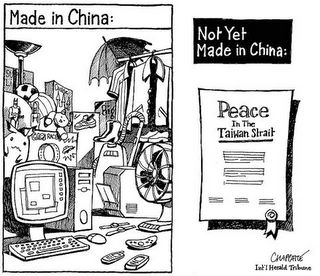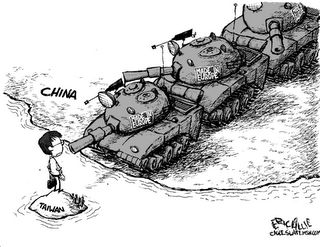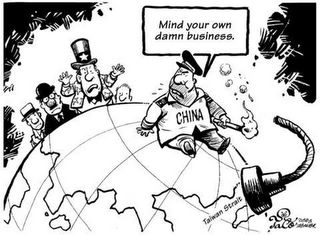Especially now that China is becoming so powerful, and praised by some many (especially the money-greedy communities who place business and money before freedoms and human rights...). I was told that it's a good thing that Taiwan, the US and some other are critical of China, since it shows a whole other side of this giant dragon, and gives us all also a sense of caution.
Maybe I'm just too obsessed...but to me, it's about the denial of such basic rights as being able to stand up and proudly be recognised as a state, as a citizen of a state, and being able to participate in the international community as an equal.
Just today, the World Health Organisation made a memorandum with China, setting out the means of cooperating and facilitating the medical needs of Taiwan.... HELLO?! That's just bizarre! How can China, a country that does not even have any say or influence in the way of life of 23 million people in Taiwan talk and deal on behalf of Taiwan?? And this is just one ridiculous example of Taiwan's exclusion and pariah status from the international community. I once wrote,
"How can it be that Taiwan, with a population and territory larger than two-thirds of UN members, is not entitled to exist as an equal actor on the world stage? How can a free democracy with a prosperous economy be treated like an international pariah? Have the Taiwanese committed a crime so criminal that they be barred from freedom for life? [...] There are states utterly insignificant, but they are part of the UN. There are states utterly repressive, but they are part of the UN. There states which blatantly violate international principles, but they are part of the UN. Taiwan is none of the above, yet she is not part of the UN."

SOURCE: Taipei Times
These words still ring true today
Such is the hypocrisy of world organisations and leaders that know nothing but political games of ignorance, and suffer from incurable symptoms of total blindness and deafness to reality.
Such injustice has shaped the way I think about the world today, about the disempowerment of the poor, illiterate, voiceless and oppressed. Maybe that's why I studied law, maybe that's why I feel law is the ideal weapon of empowerment, of talking back to power, or breaking down the constructed order of minority rule over the majority.
But then laws are ideals too...and without taking into account the realities of life, the social, economic, historical, political and human contexts in which law operates, then it is nothing more, nothing less than words.
A disclaimer: Before I get hate-mails calling me a racist and bigot, I have nothing personal against the Chinese as a people, country or civilisation. What I do have a problem is with the government and the regime that currently governs China. Think Tiananmen, think SARS, think Tibet, think Falun Gong, think gulags, think censorship of the internet... all the lies, tyranny, terror and propogand spread by the Communist Party is more than enough to make me sick.
Finally, the piece I wrote... I'm including it here, for people who are interested!
-------------------------
History
The original inhabitants of Taiwan are thought to be ancestors of the Polynesian tribes throughout the Asia-Pacific. For centuries, Han Chinese have been migrating to the island in search of a better life. Throughout Taiwan’s history, the island has always been the colony of one country or other. The Manchu Dynasty included Taiwan as part of Chinese territory for the first time in 1885. However, ten years later, China gave Taiwan “in perpetuity and full sovereignty” to Japan as a result of the Sino-Japanese war.
Japan colonised the island until the end of the Second World War in 1945, when Japan was forced to surrender all its overseas colonies. The problem was, it was not agreed who Taiwan would be given to. The Allied Supreme Command in the Pacific gave China at the time, under Chiang Kai-Shek’s Nationalist regime, the mandate to govern temporarily Taiwan until a final solution is made. However, in the meantime, the Nationalist Chiang Kai-Shek regime lost the Chinese Civil War against the Communists in China, and in 1949 fled to Taiwan and established itself there since. In 1950, after the outbreak of the Korean, US President Truman decalred that the status of Taiwan was still “undetermined” and that:
“The determination of the future status of Formosa [Taiwan] must await the restoration of security in the Pacific, a peace settlement with Japan, or consideration by the United Nations.”
Up to now, nothing concrete has been done to determine the status of the islands yet.
China’s insistent position
The People’s Republic of China’s position has been consistent ever since the 1950s: Taiwan is an inalienable part of the motherland, and must be liberated at all costs. China argues that Taiwan is a part of the motherland which has been historically unlawfully stolen by the big powers. The close cultural and ethnic ties between China and Taiwan is another reason for unification with the motherland. Hundreds of missiles are now aimed at the island. During Taiwan’s presidential elections in 1996, China ‘tested’ missiles close to the seas around Taiwan. In 2000, again just before elections in Taiwan, China warned of bloodshed if the people of Taiwan chooses a pro-independence candidate (which they actually did). In March 2005, China’s rubber-stamp parliament passed the ‘Anti-Secession Law’, which is basically a carte blanche for China to take any action it sees fit to deal with Taiwan’s separation from the mainland. The law says China would “employ non-peaceful means and other necessary measures to protect China’s sovereignty and territorial integrity.” Any state which interferes in the issue of Taiwan meets strong repercussions from China, such as a boycott on imports. Philips, Siemens, Volvo, Walmart, Airbus are just a few of the companies China plays with to threaten other countries to back down. The Taiwan issue is a matter of national pride, and a constant reminder to the Chinese of the historic humiliations China suffered in the hands of big powers. Just like Hong Kong and Macau have returned to China under the so-called ‘One Country, Two Systems’ formula, the last enclave is Taiwan. Beijing refuses to talk to anybody or any government official from Taiwan who does not recognise that Taiwan is part of China.

SOURCE: Cagle.com
Taiwan’s difficult road
For over a decade now, Taiwan has politically and socially been the most democratic country in Asia. The Chiang Kai-Shek Nationalist Chinese regime imposed 40 years of Martial Law after arriving in 1949, and dominated the political landscape and shaped national identity. The Nationalist Chinese never forgot the dream of one day returning to China, and therefore imposed Chinese indoctrination and repressed Taiwan’s population. Since the 1980s, local Taiwanese (85% of the population) increasingly demanded more freedoms and the ability to express their identities in language, culture and education. The first open and free elections were held in 1992, which installed the first local Taiwanese in the office. In 2000 and again in 2004, the Democratic Progressive Party of Chen Shui-Bian, which supports the formal independence of Taiwan, won the presidential and parliamentary elections. In recent years, Taiwan has been trying hard to join international organisations like the United Nations, the World Health Organisation, but without success. China’s veto power, military might and threats to cut economic ties with other countries, has effectively isolated Taiwan and her 23million people. Increasingly, many Taiwanese businesses are investing in China, which is benefiting both sides of the Strait. The majority of people do not want to be unified with China, nor do they want to become independent. The status quo, peace and cooperation is what most people want. Nobody in Taiwan wants to be united with a regime that is comparatively more backward, politically and socially unfree and continually threatens to use force.
The position of the International Community
Every state in the world which wants to establish diplomatic relations with China must recognise the ‘One China Policy’. This says that there is only one China in the world, and that Taiwan is a part of China. The catch lies in the word ‘recognise’. Though the vast majority of states have established relations with China, they do not do so in recognition of the ‘One China’ policy, but mere ‘acknowledge’ it. This subtle word-play has much significance. Everyone knows that Taiwan has long before Second World War had completely separate social, political and economic developments from China. Everyone knows that the People’s Republic of China has never for a day governed over the island of Taiwan or its people. Due to China’s economic and geo-political importance in the world, most states will official say that they acknowledge that Taiwan is a part of China. However, in all non-official channels every state still maintains strong links with Taiwan. Between the international community’s realpolitik and China’s unrelenting stance on the ‘internal affair’ that is Taiwan it is important to note differences in the intention to create legal obligations under international law between recognising a fact, and the mere acknowledgement of a fact.

SOURCE: Cox & Forkum
International nature of the conflict
Most states in the world, as well as the UN, cower to the bullying tactics of China in this matter. Not many dare to condemn China’s threats, or poor human rights records. The notable exception is the United States. Though the US has formal relations with China (and acknowledges that Taiwan is a part of China), under the Taiwan Relations Act 1979 it has a legal obligation to sell weapons to Taiwan and to defend Taiwan from attack. Aside from NATO allies and Israel, no other country in the world has such status with the US. President Bush said in 2000 that the US would do “whatever it takes” to aid Taiwan in the event of a Chinese invasion. When China tested missiles in 1996, two US aircraft carriers anchored in the Taiwan Strait, the biggest show of force since the Gulf War, to ease tensions. The strategic position of Taiwan governed the crossroad of the Asia-Pacific, and Taiwan, together with Japan, South Korea and the Philippines, completes the chain of islands that has traditionally been outposts of US influence in Asia. Recent reports indicate that a conflict in the area will cause an economic crisis and IT industry meltdown, due to the fact that more than 70% of the world’s processors, notebooks and LCD monitors are produced on the island. China cannot afford to ‘loose face’ and will never back down on the Taiwan issue, while the US will suffer a huge loss in its image as the protector of democracies and the support of allies, should Taiwan be swallowed by China. Early 2005, Japan and the US signed an pact which prioritises the Taiwan Strait as a major security concern.
The European Union has to date not had a great role to play. It constantly reiterates the need for dialogue and a peaceful resolution of the issue, but does not say what or how. However, recent proposals by France and Germany to lift a weapons embargo on China, in place since the Tiananmen Incident in 1989, have fuelled tensions across the Pacific and the Atlantic Oceans. Many cite the lack of any improvement in human rights and political and religious freedoms in China and the potential of fuelling an arms-race as reasons to maintain the embargo. France and Germany however are attracted by lucrative contracts.

SOURCE: Cagle.com
The Future
To summarise, the Taiwan issue is a relic from a period when the world was torn apart between peace and war, unity and separation. However, this is not just a matter of two Germanies, or two Koreas. For the People’s Republic of China, Taiwan is “purely an internal Chinese matter […] an indivisible part of Chinese territory.” For the United States and the rest of the world, it is an issue that continues to hinder relations with China, and which forces Washington and other capitals to walk the tight-rope between supporting the democratic freedoms in Taiwan and enhancing economic trade with China. For the Taiwan, the conflict has meant the continual denial of recognition and entitlements to be a fully-fledged member of the international community. From a historic point of view, it springs from the lack of attention with which international agreements were made at the end of the Second World War. As one of the last remnant of Cold War politics, the unresolved dispute between Taiwan and China has the potential to break out into a conflict that will have huge repercussions all over the world.

SOURCE: Taipei Times
The international community and the UN cannot continually deny, at the insistence and threats of Beijing, that the conflict between Taiwan and China is a non-issue. Or else world leaders will again be confronted with a ‘clash of titans. One day it must be resolved. China would to do whatever possible to ‘liberate’ the island. But brute force and threats will solve nothing, only create more problems and suffering. The freedoms and livelihoods of Taiwan’s people are at stake. Taiwan’s 23million people are those who should have the most voice in the future of their own country. No one else. And the world should listen. Whether that will be the case is another matter.

























No comments:
Post a Comment